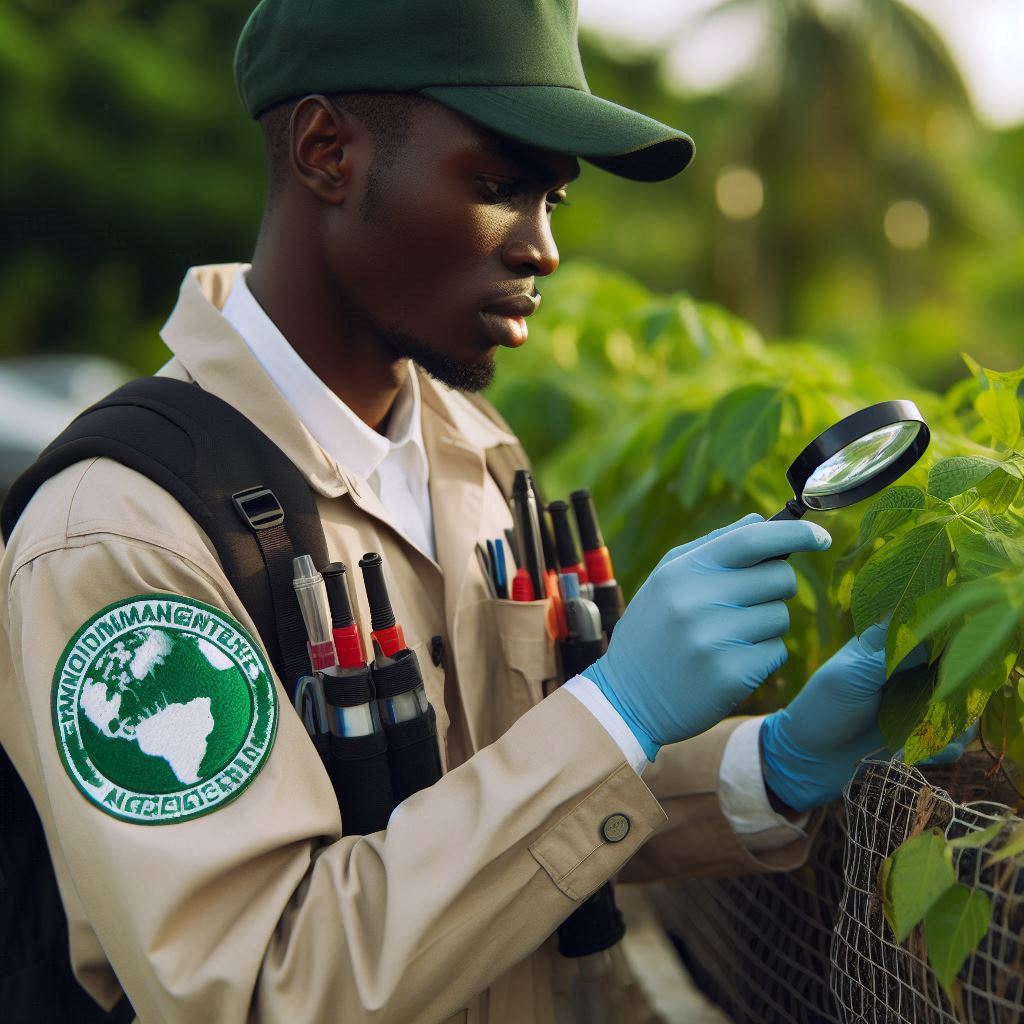Introduction
Environmental management is a multidisciplinary field dedicated to overseeing human activities and natural resources to protect ecosystems and ensure sustainability. Lets discuss on Environmental Management and Toxicology Career Paths.
It encompasses strategies and practices aimed at minimizing environmental impact, conserving biodiversity, and promoting sustainable development.
Professionals in this field work towards maintaining the balance between economic growth and environmental stewardship.
Toxicology, a branch of biology and chemistry, focuses on studying the adverse effects of chemicals and pollutants on living organisms.
It examines how these substances interact with biological systems, assessing their potential risks to human health and the environment.
Toxicologists play a crucial role in evaluating the safety of chemicals, medicines, and environmental pollutants.
In today’s interconnected world, environmental management and toxicology are more important than ever.
They address critical global challenges such as climate change, pollution, habitat destruction, and public health risks.
Effective environmental management strategies mitigate these challenges, promoting resilience and sustainable resource use.
Similarly, advances in toxicology contribute to informed decision-making and regulatory measures to protect human health and ecosystems from harmful substances.
What is Environmental Management
Environmental management involves the careful use and protection of natural resources. It aims to ensure sustainable development and minimize environmental impact.
The field encompasses policies, procedures, and practices designed to manage human activities’ effects on the environment.
Effective environmental management requires a comprehensive understanding of ecological principles, legal frameworks, and economic considerations.
Define Environmental Management
Environmental management is the practice of overseeing human interactions with the environment. This includes managing resources, reducing pollution, and promoting sustainability.
It involves a systematic approach to preserving natural ecosystems while supporting human development.
Environmental management strategies integrate scientific research, policy-making, and community engagement. The goal is to achieve a balance between economic growth and environmental protection.
Role of Environmental Managers in Organizations
Environmental managers play a crucial role in organizations. They develop and implement policies to ensure compliance with environmental laws.
Their responsibilities include conducting environmental audits, managing waste, and reducing emissions. Environmental managers also oversee the use of resources, ensuring sustainable practices.
They advise senior management on environmental risks and opportunities. This role requires strong analytical skills and a thorough understanding of regulatory requirements.
In addition, environmental managers lead environmental education and awareness programs. They train employees on sustainable practices and regulatory compliance.
These managers also coordinate with external stakeholders, including government agencies and non-governmental organizations.
By fostering collaboration, they help organizations meet their environmental objectives. Environmental managers must stay updated on emerging environmental issues and technologies.
This knowledge allows them to develop innovative solutions to complex environmental challenges.
Explain the Scope of Work in Environmental Management
The scope of work in environmental management is broad and varied. It includes activities such as waste management, pollution control, and resource conservation.
Environmental managers work in diverse sectors, including manufacturing, energy, and agriculture.
They assess environmental impacts of projects and develop mitigation strategies. This involves conducting environmental impact assessments (EIAs) and preparing reports.
Environmental management also covers regulatory compliance and monitoring. Managers ensure that organizations adhere to environmental laws and standards.
They track performance through regular audits and inspections. When non-compliance is identified, they develop corrective action plans.
Environmental managers also handle emergency response planning. They prepare organizations for environmental incidents, such as oil spills or chemical releases.
Sustainability planning is another critical area. Environmental managers develop strategies to reduce an organization’s carbon footprint.
This includes implementing energy-efficient practices and promoting renewable energy use. They also work on water conservation and biodiversity protection projects.
Environmental managers collaborate with engineers and scientists to develop green technologies. These innovations help reduce environmental impacts and improve efficiency.
Read: Nigerian Fisheries: Best Practices and Innovation
Career opportunities in Environmental Management
Potential Job Roles in Environmental Management
Environmental Management offers diverse career opportunities focused on sustainability and conservation. Environmental scientists conduct research and assess environmental impacts.
They develop strategies to mitigate pollution and promote sustainable practices. Environmental engineers design and implement solutions for waste management and environmental remediation.
They ensure compliance with regulations and minimize ecological footprints.
Job Prospects in Various Sectors
Government agencies offer significant employment opportunities in environmental management. Roles include environmental protection officers and policy analysts.
These professionals enforce regulations and develop environmental policies. Consulting firms provide services to businesses and governments.
Environmental consultants assess risks, conduct environmental audits, and recommend mitigation measures. NGOs play a crucial role in advocacy and community engagement.
They hire environmental educators, project managers, and policy advocates.
Salary Expectations and Career Growth
Salaries in environmental management vary based on education, experience, and sector.
Entry-level positions such as environmental technicians or field researchers typically start around $40,000 to $50,000 annually.
Environmental scientists and engineers with advanced degrees can earn between $60,000 to $80,000. Senior roles like environmental managers or directors may exceed $100,000, especially in larger firms or government agencies.
Career growth in environmental management is promising. As awareness of environmental issues grows, so does the demand for skilled professionals.
Advancement opportunities include leadership roles, specializing in areas like climate change adaptation or sustainable development. Continuing education and certifications enhance career prospects.
Professionals can pursue certifications such as Certified Environmental Professional (CEP) or Leadership in Energy and Environmental Design (LEED).
Basically, environmental management offers rewarding careers with opportunities for impact and growth. Whether in government, consulting, or NGOs, professionals play a vital role in safeguarding natural resources.
The field continues to expand as businesses and governments prioritize sustainability. Pursuing a career in environmental management can lead to meaningful work that contributes to a healthier planet and sustainable future.
Read: Overview of Environmental Management in Nigeria
What is Toxicology
Toxicology is the study of the adverse effects of chemical substances on living organisms. It examines how toxins interact with biological systems and their potential health impacts. Toxicologists play a crucial role in assessing chemical hazards and ensuring environmental health.
Define Toxicology
Toxicology is a scientific discipline that investigates the effects of harmful substances on organisms. It encompasses the study of toxins, their mechanisms of action, and the factors influencing toxicity. Toxicologists analyze how chemicals affect humans, animals, and ecosystems.
Role of Toxicologists in Assessing Chemical Hazards
Toxicologists assess the risks posed by chemicals to human health and the environment. They conduct toxicity tests and studies to determine safe exposure levels.
Toxicologists evaluate potential hazards associated with industrial chemicals, pollutants, pesticides, and pharmaceuticals. Their findings inform regulatory decisions and public health policies.
Toxicologists use advanced analytical techniques to measure chemical concentrations in air, water, soil, and biological samples. They interpret data to assess risks and predict potential outcomes of exposure.
Toxicologists collaborate with environmental scientists, health professionals, and policymakers to develop strategies for mitigating risks. Their expertise ensures that regulations protect public health and environmental integrity.
Importance of Toxicology in Environmental Health
Toxicology plays a critical role in safeguarding environmental health. It identifies pollutants and contaminants that threaten ecosystems and human well-being.
Toxicologists study how chemicals bioaccumulate in food chains, affecting wildlife and human populations. Understanding these pathways helps prevent environmental degradation and adverse health effects.
Environmental toxicology examines the long-term effects of chemical exposure on biodiversity and ecosystem stability. Toxicologists investigate the ecological impacts of pollutants, such as habitat loss and species decline.
They assess the cumulative effects of multiple stressors on ecosystems, guiding conservation efforts and ecosystem management practices.
Toxicology informs environmental risk assessments and remediation strategies.
By identifying hazardous substances and their effects, toxicologists support efforts to clean up contaminated sites and restore ecosystems. Their research contributes to sustainable development practices that minimize environmental impact and promote ecosystem resilience.
In review, toxicology is essential for understanding and mitigating the impacts of chemical substances on environmental and human health.
Toxicologists play a vital role in assessing chemical hazards, informing regulatory decisions, and promoting sustainable practices. Their work contributes to a safer and healthier environment for current and future generations.
As environmental challenges evolve, the role of toxicology remains indispensable in ensuring a balanced coexistence between human activities and the natural world.
Read: Environmental Impact Assessments in Fisheries
Career opportunities in Toxicology
Job Roles Available to Toxicologists
Toxicology, a field at the intersection of biology, chemistry, and environmental science, offers a wide array of career paths across various sectors.
Professionals in this field specialize in studying the effects of chemicals and pollutants on living organisms, evaluating risks, and developing strategies to mitigate harm.
Research Toxicologists conduct studies to understand how chemicals interact with biological systems. They work in universities, research institutions, and private laboratories, focusing on advancing scientific knowledge and developing new insights into toxicological processes.
Regulatory Toxicologists are employed by government agencies such as the Environmental Protection Agency (EPA) or the Food and Drug Administration (FDA).
They ensure that products, chemicals, and environmental practices comply with safety regulations. Their work involves setting standards, assessing risks, and recommending safety guidelines to protect public health.
Clinical Toxicologists specialize in diagnosing and treating poisonings and toxic exposures in medical settings.
They collaborate with healthcare teams to manage cases of overdose, chemical exposures, and adverse drug reactions, applying their expertise to save lives and prevent further harm.
Environmental Toxicologists focus on assessing the impact of pollutants on ecosystems and wildlife.
They work for environmental consulting firms, governmental agencies, and non-profit organizations. Their research informs environmental policies and guides efforts to mitigate pollution and protect natural habitats.
Potential Employers
Toxicologists find employment in a range of organizations and industries. Research institutions and universities offer opportunities for conducting fundamental research and advancing scientific knowledge.
Pharmaceutical and biotechnology companies employ toxicologists to evaluate the safety and efficacy of new drugs and chemicals.
Environmental consulting firms hire toxicologists to assess contamination levels, develop remediation plans, and ensure compliance with environmental regulations.
Governmental agencies play a crucial role in employing toxicologists for regulatory purposes.
The EPA, FDA, Occupational Safety and Health Administration (OSHA), and other regulatory bodies rely on toxicologists to assess risks, set safety standards, and enforce regulations to protect public health and the environment.
Salary Expectations and Career Advancement
Salaries for toxicologists vary depending on factors such as education, experience, industry, and geographical location. Entry-level positions typically offer salaries ranging from $50,000 to $70,000 annually.
With experience and specialization, toxicologists can earn salaries exceeding $100,000 per year, particularly in pharmaceutical companies and private sector roles.
Career advancement in toxicology often involves pursuing advanced degrees (such as a Master’s or Ph.D.) and obtaining certifications in specialized areas of toxicology.
Professional certifications, such as those offered by the American Board of Toxicology (ABT), can enhance credibility and open doors to higher-level positions and leadership roles within organizations.
Leadership roles in toxicology, such as Toxicology Manager, Director of Regulatory Affairs, or Chief Toxicologist, offer increased responsibility and higher earning potential.
These positions involve overseeing teams, shaping policy decisions, and contributing to strategic planning efforts within organizations.
Generally, toxicology presents dynamic career opportunities for individuals passionate about environmental health, public safety, and scientific research.
The field continues to evolve with advancements in technology and growing awareness of chemical hazards.
Pursuing a career in toxicology can lead to impactful work in safeguarding human and environmental health, making it a rewarding choice for aspiring professionals in the sciences.
Read: Role of Fisheries in Nigerian Food Security

Education and Skills Required for a Career in Environmental Management and Toxicology
Embarking on a career in environmental management and toxicology demands specific educational qualifications and essential skills. Here’s a comprehensive guide to what you need to know:
Academic Qualifications Needed for Entry-Level Positions
To start in environmental management or toxicology, a bachelor’s degree in fields like environmental science, biology, chemistry, or related disciplines is typically required.
These programs provide foundational knowledge in ecology, environmental chemistry, toxicology principles, and environmental laws.
Some positions, especially those in research or advanced management roles, may require a master’s degree or even a doctoral degree for specialized fields such as environmental toxicology.
Importance of Acquiring Specific Skills
Acquiring specific skills is crucial for success in these fields. Proficiency in data analysis is essential for interpreting environmental data, conducting risk assessments, and making informed decisions.
Skills in environmental regulations are vital for understanding and complying with local, national, and international laws governing environmental protection.
Professionals also need strong communication skills to effectively convey complex scientific information to diverse audiences, collaborate with stakeholders, and advocate for environmental initiatives.
Information on Relevant Certifications and Training Programs
Obtaining certifications can enhance career prospects and demonstrate proficiency in specialized areas.
Certifications such as Certified Environmental Professional (CEP), Certified Hazardous Materials Manager (CHMM), or similar credentials are valuable in demonstrating expertise and commitment to environmental stewardship.
These certifications often require passing examinations and maintaining continuing education requirements, ensuring professionals stay updated with industry standards and best practices.
Transform Your Career with Expert Guidance
Get personalized mentorship consulting that’s tailored to your unique path. Our expert advice is actionable and exclusive.
Get StartedTraining programs offer additional opportunities to acquire specialized knowledge and practical skills.
Programs in environmental auditing, pollution prevention, waste management, and chemical safety provide hands-on experience and exposure to real-world environmental challenges.
Many universities, professional organizations, and government agencies offer these programs, which may include workshops, seminars, and fieldwork to complement academic learning.
Environmental management and toxicology careers are dynamic and multifaceted. Professionals in these fields play crucial roles in protecting ecosystems, public health, and natural resources.
They work across sectors such as government agencies, consulting firms, non-profit organizations, research institutions, and industry.
Their responsibilities include conducting environmental assessments, developing and implementing environmental policies, managing hazardous materials, investigating pollution incidents, and advocating for sustainable practices.
Challenges and Opportunities in Environmental Management and Toxicology
Current Challenges Faced by Professionals
Professionals in environmental management and toxicology encounter several challenges in their work. One major challenge is combating climate change and its diverse impacts on ecosystems.
Rising global temperatures, erratic weather patterns, and sea-level rise threaten biodiversity and human livelihoods.
Pollution remains a persistent challenge. Air, water, and soil pollution from industrial activities, urbanization, and agricultural practices degrade environmental quality. Contaminants such as plastics, heavy metals, and chemicals pose risks to human health and ecosystems.
Regulatory complexities also challenge professionals. Navigating diverse environmental laws and regulations requires expertise and diligence to ensure compliance and effective environmental stewardship.
Limited funding and resources further constrain efforts to address these complex issues comprehensively.
Emerging Trends and Technologies
Despite challenges, advancements in technology offer new opportunities for environmental management and toxicology.
Remote sensing technologies, such as satellite imagery and drones, enhance monitoring and assessment of environmental changes over large areas. Geographic Information Systems (GIS) provide spatial data analysis tools crucial for planning and decision-making.
Bioremediation and green chemistry present innovative approaches to mitigate pollution. Bioremediation uses microorganisms to degrade pollutants, while green chemistry develops environmentally friendly chemicals and processes to minimize environmental impact.
Renewable energy technologies, including solar and wind power, contribute to reducing greenhouse gas emissions and promoting sustainable energy sources. Energy-efficient technologies and sustainable building practices support environmental conservation efforts.
Staying Updated and Relevant
To thrive in the rapidly evolving fields of environmental management and toxicology, professionals must prioritize continuous learning and adaptation.
Engaging in professional development opportunities, such as workshops, conferences, and online courses, keeps professionals abreast of new research findings, technologies, and regulatory updates.
Networking with peers, industry experts, and policymakers fosters collaboration and knowledge exchange.
Joining professional organizations, like the Society of Environmental Toxicology and Chemistry (SETAC) or the Environmental Protection Agency (EPA), provides access to resources, mentorship, and career advancement opportunities.
Embracing interdisciplinary approaches enhances problem-solving skills. Collaborating with experts in related fields, such as ecology, public health, and engineering, enables holistic solutions to complex environmental challenges.
Adopting a proactive stance towards sustainability and environmental stewardship demonstrates leadership in the field. Advocating for policies that promote environmental protection and public health strengthens professional influence and contributes to positive societal change.
In closing, while environmental management and toxicology face formidable challenges, they also present exciting opportunities for innovation and impact.
Leveraging emerging technologies, embracing interdisciplinary collaboration, and staying informed are essential strategies for navigating the complexities of these dynamic fields.
By staying updated and relevant, professionals can effectively contribute to a sustainable future and make a meaningful difference in environmental conservation and human well-being.
Conclusion
After exploring various career paths in environmental management and toxicology, it is evident that these fields offer a wide range of opportunities for individuals passionate about environmental sustainability and public health.
Environmental managers play a crucial role in developing and implementing strategies to protect and conserve our natural resources, while toxicologists focus on identifying and assessing the impact of harmful chemicals on ecosystems and human health.
Whether working in government agencies, research institutions, consulting firms, or non-profit organizations, professionals in these fields are at the forefront of addressing pressing environmental issues such as pollution, climate change, and biodiversity loss.
Individuals interested in pursuing a career in environmental management or toxicology should consider obtaining a relevant degree in environmental science, biology, chemistry, or a related field, as well as gaining practical experience through internships or research projects.
By entering these fields, individuals have the opportunity to make a positive impact on the environment and public health, contributing to a more sustainable and healthy future for generations to come.
Lastly, a career in environmental management or toxicology offers a rewarding and impactful path for individuals passionate about protecting the environment and promoting public health.
I encourage readers to consider pursuing a career in these fields, as their work is essential in addressing environmental challenges and safeguarding public well-being.
By emphasizing the importance of environmental management and toxicology, we can collectively work towards a more sustainable and healthy planet for current and future generations.




